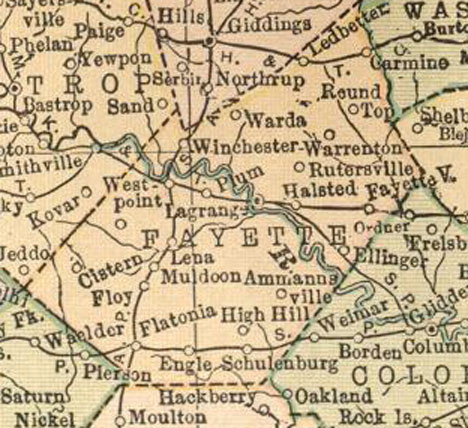A Comprehensive Exploration Of Fayette County, Texas: Unveiling Its History, Geography, And Significance
A Comprehensive Exploration of Fayette County, Texas: Unveiling its History, Geography, and Significance
Related Articles: A Comprehensive Exploration of Fayette County, Texas: Unveiling its History, Geography, and Significance
Introduction
With enthusiasm, let’s navigate through the intriguing topic related to A Comprehensive Exploration of Fayette County, Texas: Unveiling its History, Geography, and Significance. Let’s weave interesting information and offer fresh perspectives to the readers.
Table of Content
A Comprehensive Exploration of Fayette County, Texas: Unveiling its History, Geography, and Significance
Fayette County, nestled in the heart of Texas, boasts a rich tapestry of history, culture, and natural beauty. Its landscape, shaped by rolling hills, fertile farmlands, and meandering rivers, has played a pivotal role in the state’s development. Understanding the geography of Fayette County through its map unveils a fascinating story of human settlement, economic evolution, and enduring cultural traditions.
Delving into the County’s Geographic Foundation
Fayette County occupies a central position in the state, bordered by Colorado, Austin, Lavaca, and Lee counties. Its location, strategically placed between the major cities of Austin and Houston, has contributed significantly to its economic growth and cultural exchange.
The Map as a Window to History
The map of Fayette County reveals a history deeply intertwined with the Texas landscape. Its earliest settlements, established in the mid-19th century, were driven by the promise of fertile land for agriculture. The county’s name itself, bestowed in honor of the Marquis de Lafayette, a French hero of the American Revolution, further emphasizes its connection to historical events.
Unveiling the Topography and Features
The county’s topography is characterized by gently rolling hills, creating a picturesque landscape that lends itself to both agriculture and recreational activities. The Colorado River, a prominent feature, flows through the county, providing a vital water source and a scenic attraction.
Exploring the County’s Towns and Cities
Fayette County is home to a diverse array of towns and cities, each with its unique character and historical significance. The county seat, La Grange, is a vibrant hub of commerce and culture, known for its historic courthouse square and its rich German heritage. Other notable towns include Schulenburg, Fayetteville, and Round Top, each offering a glimpse into the county’s past and present.
The Economic Landscape: From Agriculture to Industry
Historically, agriculture has been the backbone of Fayette County’s economy. The county’s fertile soil supports a thriving agricultural industry, producing a wide range of crops, including cotton, corn, and soybeans. However, in recent decades, the county has witnessed a diversification of its economic base, with industries such as manufacturing, tourism, and healthcare playing increasingly significant roles.
Cultural Tapestry: A Fusion of Heritage and Modernity
Fayette County is a melting pot of cultures, with German, Czech, and African American influences shaping its unique character. The county’s rich cultural heritage is reflected in its festivals, music, and cuisine. The annual Round Top Antiques Fair, attracting visitors from around the world, is a testament to the county’s artistic and cultural vibrancy.
The Map as a Guide to Exploration
The map of Fayette County serves as an invaluable tool for exploring its diverse attractions. Whether you are interested in historical sites, scenic landscapes, or cultural experiences, the map provides a clear roadmap for your journey.
Understanding the Importance of Fayette County
Fayette County holds immense significance for both Texas and the United States. Its agricultural contributions, historical legacy, and cultural richness have shaped the state’s identity and continue to inspire innovation and growth.
FAQs about Fayette County, Texas
1. What is the population of Fayette County?
As of the 2020 Census, the population of Fayette County is estimated to be around 25,000.
2. What are the major industries in Fayette County?
The major industries in Fayette County include agriculture, manufacturing, tourism, and healthcare.
3. What are some of the notable historical sites in Fayette County?
Notable historical sites in Fayette County include the Fayette County Courthouse, the Schulenburg Railroad Depot, and the Fayetteville Historic District.
4. What are some of the popular tourist attractions in Fayette County?
Popular tourist attractions in Fayette County include the Round Top Antiques Fair, the Colorado River, and the La Grange Historic District.
5. What are some of the cultural events held in Fayette County?
Fayette County hosts numerous cultural events throughout the year, including the Schulenburg Oktoberfest, the La Grange German Heritage Festival, and the Fayetteville Bluegrass Festival.
Tips for Exploring Fayette County
- Plan your trip in advance: Research the attractions you want to visit and book accommodations ahead of time.
- Allow ample time: Fayette County offers a wealth of experiences, so allocate sufficient time to explore its diverse attractions.
- Consider visiting during a festival: Fayette County is known for its vibrant festivals, which provide an immersive cultural experience.
- Explore the local cuisine: Sample the county’s unique culinary offerings, which blend German, Czech, and American influences.
- Engage with the local community: Interact with the friendly locals to gain a deeper understanding of the county’s history and culture.
Conclusion
The map of Fayette County, Texas, is more than just a geographical representation; it is a window into a rich history, a vibrant culture, and a landscape that continues to inspire and captivate. By understanding its geography, history, and cultural tapestry, we gain a deeper appreciation for the enduring legacy of Fayette County and its vital role in the fabric of Texas.




Closure
Thus, we hope this article has provided valuable insights into A Comprehensive Exploration of Fayette County, Texas: Unveiling its History, Geography, and Significance. We thank you for taking the time to read this article. See you in our next article!